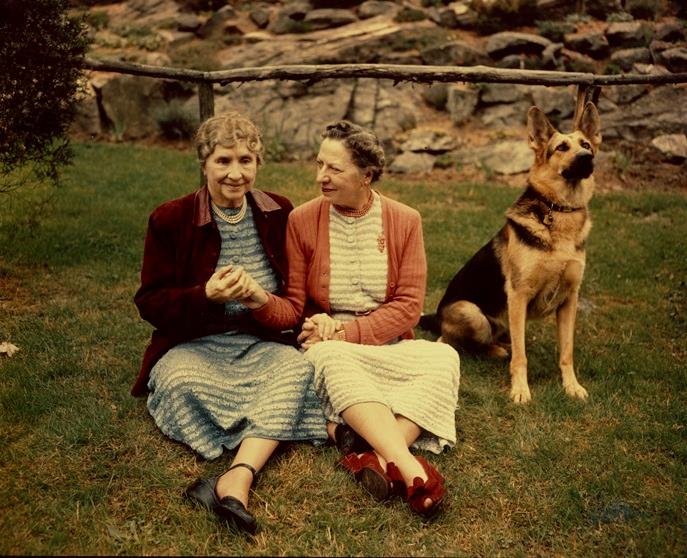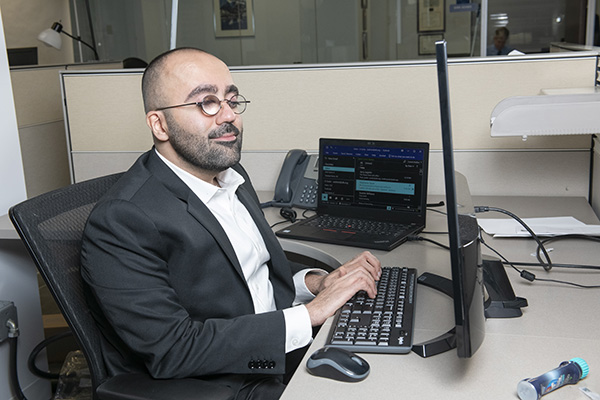A Listening Tour of the AFB Talking Book Archives
In 2015, AFB won the first of two major grants from the National Endowment for the Humanities to begin digitizing Helen Keller’s massive collection of correspondence, photographs, and other papers under the guidance of archivist Helen Selsdon. Five years later, the digital Helen Keller Archive is the most accessible online archive around, made publicly available in time for the centennial celebration this autumn of the founding of AFB.
As a disability historian working down the road at New…
Blog Topics
Helen Keller, Audio Description
Nine Months In: How the COVID-19 Pandemic Impacted Education of Children with Visual Impairments
As last winter’s holiday season approached, I think we all realized that the COVID-19 pandemic was not going away anytime soon. All facets of our lives were being impacted, including the education of our children. As a family member of two young children shared in the introduction to the just-released Access and Engagement II report, “Everybody has had to adapt to crazy things that are not very normal. People are getting tired of this [COVID-19] stuff but we have to move forward with the…
Blog Topics
Research, Coronavirus (COVID-19) Resources, Education
Celebrate Global Accessibility Awareness Day (GAAD)!
Happy Global Accessibility Awareness Day (#GAAD)! The purpose of GAAD is to get everyone talking, thinking, and learning about digital access and inclusion. From podcasts and blog posts, to inclusive accessibility solutions, public policy, and resources, AFB has you covered. Global accessibility is more than a day for us, it's 100 years of commitment.
Inform & Connect, Season 2: AFB Trustees Sarah Herrlinger and Christopher Patnoe
We are excited to welcome Sarah Herrlinger of Apple and…
Blog Topics
Accessibility, Assistive Technology, Technology, Public Policy, Research
Why Automated Scanners Aren’t the Solution
Tech Notes
An automated scanner is a special piece of software which is mainly designed to scan and test a single web page or an entire website to determine whether or not a web application is compliant with the Web Content Accessibility Guidelines (WCAG) or Section 508 accessibility regulations.
Often companies use these tools to quickly gauge compliance with the accessibility guidelines to make their website accessible. This is clearly a mistake.
Automated scanners do have some uses.…
Blog Topics
Assistive Technology, Technology, Accessibility, Talent Lab Tech Notes
Introducing ‘Our History’: AFB’s New Historical Timeline
As part of the American Foundation for the Blind’s (AFB) year-long centennial celebration, we recently published Our History, a robust new timeline outlining AFB’s past. Lesser-known milestones in advocacy, education, and technological innovation are all chronicled, from the creation of Talking Books in the 1930s, to the first international conference on AIDS-related vision loss in the 1990s, to our most recent work to study the impact of the COVID-19 pandemic on adults and students who are…
Blog Topics
Helen Keller, Reading
Sharing Our Story: 100 Years of Creating a World with No Limits
Hi there,
As a man who is completely blind, I have personally benefited from the progress that AFB has made possible. I have also experienced a world of limits.
When I was five years old, my retinas detached and I lost my eyesight. I was sent to a state residential school where I learned how to read and write braille, travel with a white cane, and type on a typewriter. I was taught to love myself, my body, and what it could do. Everything was possible: hiking, horseback riding, and even…
Blog Topics
Personal Reflections
Is Your Website Accessible? Here's Something to Try.
Tech Notes
Is your website accessible? It's a complicated question. There is certainly no shortage of automated scanners, tests, and overlays that purport to tell you what to fix, or supposedly "fix" it for you. But even if there was a perfect automated solution that would find and fix technical compliance issues (which there isn't, by the way, not even close), wouldn’t that be missing the point? If "accessible" is what we're aiming for, anything less is technically illegal, making it the…
Blog Topics
Accessibility, Talent Lab Tech Notes
Animal Friends: Helen Keller’s and Yours

Helen Keller loved animals! April 2021 is #NationalPetMonth, and as we post images from the Helen Keller Archive of some of the 16 pet dogs that Helen treasured during her long life, we invite you to submit images of your pets! Tell us how your animal friends have enriched your lives!
In November of 1967, fifth grader Robin Gates wrote to Helen Keller to ask of Helen's dog Lioness and shares how she enjoys reading of Helen's life:
3126 Cold Springs Rd.
Baldwinsville, N.Y.
Nov. 19, 1967…
Blog Topics
Helen Keller
Celebrating Assistive Technology Awareness Day

Wednesday, April 14, 2021, is National Assistive Technology (AT) Awareness Day. AFB is committed to increasing access to AT and other accessible technologies as part of our public policy advocacy, and AccessWorld frequently features new technologies in its monthly issues. In honor of the day, we are highlighting what assistive technology means to people who are blind or have low vision. For those who already use assistive technology, we also encourage you to spread the word and raise awareness…
Blog Topics
Accessibility, Assistive Technology, Public Policy
Making the Virtual Workplace Accessible
Tech Notes
Many industries have accelerated their transition to a virtual workplace due to COVID-19 over the past year. The conventional office we are most used to has desks, pens, printers, and industry-specific equipment. The individual cubicles may be laid out to promote open collaboration or snugly compartmentalized for individual contribution. Thought was put into each component at some level—whether it be cost, compliance, efficiency, a well-deserved perk, or a dire necessity. The…